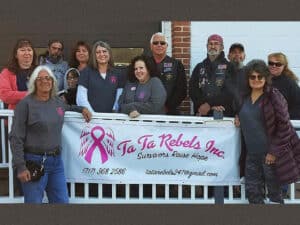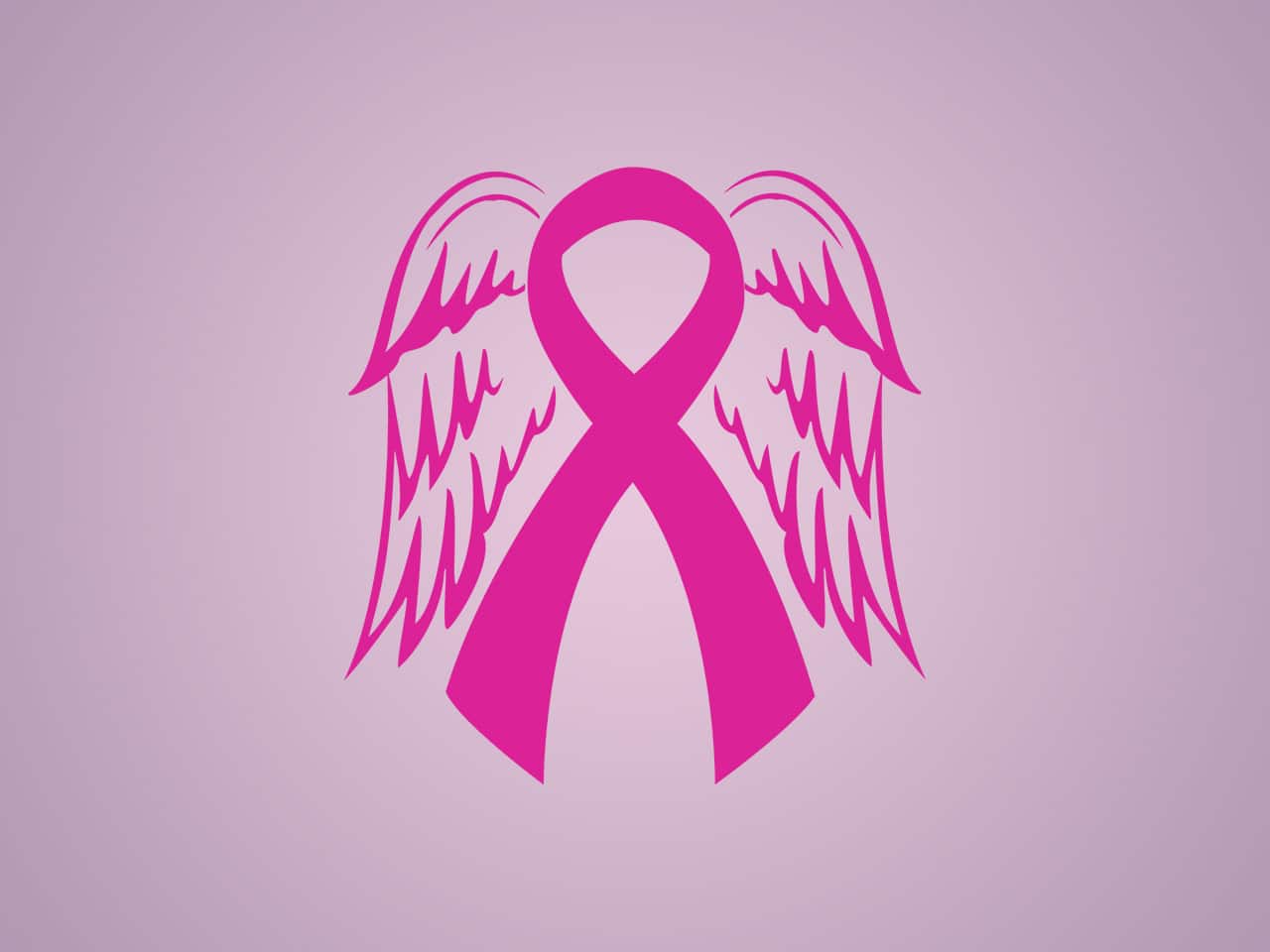One of our clinical advisors, Adie MacKenzie, recently interviewed Kim Ramirez, a lymphedema patient, breast cancer survivor, and founder of the non-profit Ta Ta Rebels. Kim has an amazing story and organization, and we were lucky enough to meet her at the Lymphedema Treatment Act’s celebration event in Washington, D.C. in May. Read the interview below!
Interview Record
As a Certified Lymphedema Therapist (CLT), it’s my job to educate my clients as to what can lead to swelling after cancer treatment. CLTs help our clients understand which activities are best modified or avoided, and what exercises and interventions, such as wearing compression, can help mitigate or prevent unwanted results. In my own practice, I constantly work with each client to try to come up with ways to make these recommendations support them to go on with their own hobbies, and to fulfill their job requirements. This can be tricky sometimes, but it is crucial to consider and address.

Breast cancer survivor Kim Ramirez is the founder of the Ta Ta Rebels, a 501(c)3 non-profit organization founded to support breast cancer survivors with out-of-pocket expenses and to raise survivorship awareness. She has had a longstanding passion for riding motorcycles. That is one of those types of activities that might be advised against to a survivor who has been treated for breast cancer with removal of lymph nodes, not to mention the other treatment aspects that can increase the risk of lymphedema like radiation and some chemotherapies.
In Kim’s case, despite the significant impact that lymphedema has had on the way she engages in motor sports, she has figured out how to manage her own lymphedema while continuing to follow her passion, and she has turned her own challenges into a resource to help others obtain the things they need to manage their own.
Not to suggest this is easy for her, however. She tells me that things like the basic activities of tying shoes and fastening buttons are challenges as are driving, and she no longer feels safe to ride her motorcycle independently. She needs to take breaks with household maintenance work and may experience pain when attempting these. And she reports a problem that I often hear and that I experience myself, that the swelling is more located in the shoulder area than in the arm, and this can be harder to compress and treat.
Still, I want to emphasize that Kim had taken this adversity and turned it into a mission. She is helping others via her organization, the Ta Ta Rebels.
Here is her story in response to a number of my questions.
Adie: I understand you are a Breast Cancer survivor yourself, as am I. Would you be open to sharing a bit about your diagnosis and treatment?
Kim: I was diagnosed May 4, 2012 after a mammogram showed a small lump on my right side close to my chest wall. After a sonagram and a biopsy, I was diagnosed with ductal carcinoma in situ (DCIS) Stage 1 and sent for surgery. I had a partial mastectomy on June 23, 2012 and started the treatment journey. After the initial surgery I went for a second opinion, and, as my margins were clear and no BRCA mutation was detected, I was able to avoid a full double mastectomy. My treatment consisted of steroids, radiation and hormone blockers but I had to stop taking the hormone blockers within two months because they put me into liver failure. The radiation caused second and third degree burns and scarred me permanently. Reconstruction was no longer an option.
Adie: Wow; that sounds so difficult! When did you notice that you had Breast Cancer Related Lymphedema? Did you have any education in advance to prepare you for this to occur?
Kim: I thought I was having a heart attack – I had sharp chest pains and my blood pressure skyrocketed. I was not aware that my issues were caused by lymphedema. I was given very little information on this or any of the symptoms. I was told that it was a possibility but rarely happens. After ruling out many other things it was finally determined to be lymphedema in June 2016, four years after my diagnosis.
Adie: What was it that specifically motivated you to start Ta Ta Rebels? Did you personally have difficulty with your insurance covering lymphedema supplies, or was that something that you noticed in your community?
Kim: After my diagnosis and discovering that my insurance did not cover the expense for lymphedema therapy, DME, or other therapies, I then discovered that all the many breast cancer organizations couldn’t help because I was no longer in cancer treatment. There were absolutely no resources to assist me with the costs of sleeves or lymphedema therapy. That was when I realized that I was not alone in this struggle. There are many survivors that have nowhere to turn for financial assistance.

Adie: What were the main challenges you faced in starting your organization?
Kim: The biggest challenge was when we realized that you must be a 501(c) for at least three years to be considered to receive donations from many of the businesses. It took two years to become a qualified 501(c) (we had a lawyer do it pro bono) in January 2018. We relied heavily on the private club sector for funds. They must donate 60% to charities and we were very lucky to have the support of the American Legion Riders to help make that happen for us. We are now reaching seven years and it’s still a struggle because we are a small organization that is 100% volunteers. The larger businesses want to see more of a media presence for their support.
Adie: How do you prioritize to determine who will receive benefits through Ta Ta Rebels, and setting the amounts of assistance for each applicant?
Kim: We have certain guidelines that we must follow that are in our bylaws and Articles of Incorporation. The main ones are that you must have completed cancer treatment and surgeries (not eligible for other resources), be a Pennsylvania resident, and the need must be medically related to a breast cancer diagnosis. We review each request to make sure we are giving the applicant the most possible within our guidelines. Our max is $250.00 per year but we have made exceptions for different reasons. We do not assist with household expenses like rent, electric, heating or such.
Adie: We met at the celebration for the passage of the Lymphedema Treatment Act; that was a nice meeting for both of our groups! How have you connected with other organizations that donate and support yours?
Kim: We have a good relationship with the PA Breast Cancer Coalition patient advocate, Dolores Magro. Our organizations share information to help those that reach out to us for assistance. We also work with the Pink Hands of Hope organization in Mechanicsburg. They assist with wigs, bras, and other clothing for those during treatment. They also provide gas cards to help with the expense of the many appointments. They don’t support us monetarily, but their support is greatly appreciated because it gets our information out into the community.
We have been given great monetary support from the Wawa foundation and Marketing Performance Group(MPG). The MPG also volunteers for outreach events, and we had a blast with them. They created a challenge amongst themselves to see who could raise the most money with our bean bag toss at three of our events. It was quite entertaining. Since we are 100% volunteers, we value each one of them. They all contribute in some way to making the organization successful. Our donors range from the local businesses to some from out of state. Most of our donations are used for the main events raffles – we receive hotel stays, gift cards, admissions to amusement parks, theatre shows, many different venues offering passes for bowling, cart racing, Crayola factory, Ferry boat, Railroad excursions, and so much more. I am very pleased to state that many of our donations are repeats of what we have received from the first year and every year since.
Adie: This sounds like a very vibrant group with a lot of fun events and dedicated volunteers! Can you share a story about one of the best experiences you have had with supporting an individual?
Kim: There are so many great experiences, the ones that are my favorites are the ones where they state that they are so happy to have found us and that we are able to help them. By the time a survivor reaches us they are often at the end of their rope and so stressed with the expenses. It feels great to be able to take some of that burden away and give them some peace of mind. That just reinforces that there is a definite need for what we do for survivors, many of whom don’t have the financial resources that are needed to manage their needs. It is a real struggle and sometimes choosing between buying groceries or paying rent is more of a priority than getting a compression sleeve or going to therapy or buying a bra needed for the prosthesis. These are the ones that make what we do more satisfying because we help them to do what is needed to have a healthy survivorship journey.
Adie: Have there been particular challenges or situations that have created conflict within the organization? What has been your success strategy to deal with these?
Kim: As with any organization there are a lot of personalities to work with. In 5 years, we have only encountered two situations that were troubling, and we resolved the issues as a group. This was very helpful in making every volunteer feel that their voice was heard. We do not dismiss any ideas, suggestions or feelings without discussion. Too many of us have had that happen to us during our cancer treatments so we make sure that everyone can express themselves without judgement or repercussions.
Adie: What are your dreams for the future of the Ta Ta Rebels? Do you have a 5-year, 10-year, etc. type of plan?
Kim: We reached our 5-year goal and that was to be able to service ALL Pennsylvania residents. We started out serving just the Central PA area but have expanded to all residents in the past two years. I am hoping that in 10 years we have some substantial funding to be able to increase our financial assistance amount to $500.00. We were able to raise it from our starting point of $150.00 per calendar year to $250.00 by the fourth year. Our goal is to help relieve the burden of choosing household expenses over medically needed ones.
Adie: Do you have words of advice for others who are motivated to start a non-profit?
Kim: Starting and maintaining a non-profit is A LOT of work and takes dedication and requires support from many people. Most organizations don’t make it past three years. We had the additional challenge of surviving through a pandemic that closed a few of the nonprofits we were familiar with. It was during that time that we really had to think outside of the box since most outreach events were canceled, but we were able to still hold our annual event since it took place outdoors. It was one of the largest turnouts we had for motorcycle riders. If there hadn’t been a hurricane last year, I think we would have doubled our attendance, but we lost most of our riders due to the weather although we still had about dozen die-hards. With 140 people in attendance, the event raised $7500.00 for our programs.
From this inspiring conversation, it’s clear that a motivated patient with a personal mission can be successful with grassroots organizing! AIROS Medical is proud to be able to support this effort and we look forward to increased interaction and partnership with the Ta Ta Rebels! We will be hearing more from this group in the near future, and we look forward to comments and questions. Please feel free to forward any of these to me at amackenzie@airosmedical.com.
